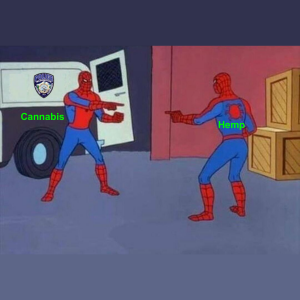Arguably arbitrary thresholds and limits had come to predominate conversations around safety in cannabis products and how to distinguish hemp consumables in Washington state.
Here’s a look at cannabis-related policymaking events on the calendar in the week ahead.
Monday June 5th
WSLCB - Board Caucus
On Tuesday at 10am PT, the weekly Washington State Liquor and Cannabis Board (WSLCB) Board Caucus was scheduled to recur.
- [ Event Details ]
- Normally hosted weekly on Tuesdays, the WSLCB Board Caucus would be hosted on Monday this week.
- As part of the preparation for rulemaking during the Wednesday June 7th Board Meeting, Policy and Rules staff would brief board members on what appeared to be a previously unmentioned petition received on April 19th to specify an action level for dichlorodiphenyldichloroethylene (DDE) in cannabis products.
- During the May 2nd board caucus, Policy and Rules Manager Kathy Hoffman indicated a similar petition sent in “a couple weeks ago” requested the board consider specifying “default” pesticide action levels for compounds without levels already in rule of 0.1 parts per million on “the additional pesticides that the [Washington State Department of Agriculture] test for” as the Board specified “59 of those 243 in rule.” She anticipated this petition would be addressed by staff on June 7th, but it was not listed at publication time (audio - 1m, video - TVW).
- The petition was filed by Todd Luther, an owner of Okanogan Gold, one of the five licensed businesses targeted by the WSLCB environmental pesticide actions whose license had been placed on administrative hold pending the outcomes of an investigation of DDE levels in their products. Luther suggested “Low DDE levels are not harmful” and asked regulators to “Increase the maximum allowed levels of DDE in all cannabis products to 0.5ppm, or to a more acceptable level.”
- Cannabis Observer requested the end product test results for items collected from various retailers by WSLCB staff following the agency action. The testing of Okanogan Gold oil cartridges conducted by Washington State Department of Agriculture (WSDA) staff showed DDE between 0.31-0.39 parts per million (ppm).
- The memorandum compiled by WSLCB Policy and Rules staff provided a history of the specification of pesticide action levels for cannabis and cannabis products in Washington State, and included the following research interpretations of potential harmful effects of DDE in humans:
- “The National Cancer Institute (NCI) DDE Bioassay suggests the liver is the primary target in mammals. Liver lesions were identified at a ‘Lowest-Observed-Adverse-Effect level’ of 0.25 mg/kg/day. DDE is most likely carcinogenic to humans based on liver tumor formation in rodent studies. Studies have also shown that DDE is an endocrine disruptor and competes with testicular hormones for the androgen receptor resulting in altered gene expression. The journal, Environmental Research, published an article which found that young people with high blood levels of DDEs were twice as likely to be diagnosed with celiac disease.”
Tuesday June 6th
At publication time, no cannabis-related policymaking events were scheduled.
Wednesday June 7th
WSLCB - Board Meeting
On Wednesday at 10am PT, the bi-weekly WSLCB Board Meeting was scheduled to recur.
- [ Event Details ]
- Before addressing the rulemaking petition on DDE levels in cannabis products, members would receive a “PESTICIDE / DDE UPDATE” by Enforcement and Education Director Chandra Brady.
- During the May 24th Board Meeting, I asked that board members and agency staff offer more public updates related to on-going environmental pesticide actions (audio - <1m, video - WSLCB, video - TVW).
- Brady last addressed the board on this subject on April 18th to highlight new test results and stakeholder meetings she’d convened the preceding week, evoking several questions from board members.
Thursday June 8th
WA Hemp in Food Task Force - Meeting
On Thursday at 9am PT, the Washington State Hemp in Food Task Force (WA Hemp in Food Task Force) planned to convene.
- [ Event Details ]
- Task force members last convened on May 18th to search for a path forward to advise on regulation of hemp consumables after SB 5367 was signed into law and before funding for the task force expired on June 30th.
- Several task force members also sit on the WSLCB Cannabinoid Science Work Group which convened on Thursday June 1st. WSLCB Director of Policy and External Affairs Justin Nordhorn provided a lengthy introduction on the subject of implementation of SB 5367 in which he claimed the legislation “doesn’t necessarily align” with the agency position on the presence of detectable amounts of THC in cannabis products outside of the 502 system. He asserted that no single regulatory agency could implement the legislative mandate by declaring a specific amount of THC as a limit, and indicated an alternative approach being considered was to establish a standard method for the detection of THC - likely via the WSDA Cannabis Labs Accreditation Standards Program (CLASP).
- WSDA Cannabis Programs Manager Trecia Ehrlich had earlier indicated the CLASP team would not be able to assist on that process before the fall absent guidance and additional funding from the legislature or elsewhere.
- Task force members had been conflicted about the idea of inviting WSLCB staff to participate in their subsequent meetings to venture a more collaborative approach with hemp stakeholders. At publication time, the invitation Cannabis Observer had access to did not include WSLCB staff.
- The task force was also scheduled to meet on June 22nd.
Friday June 9th
At publication time, no cannabis-related policymaking events were scheduled.
